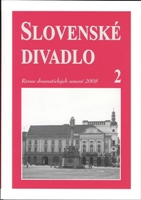Koncepcia divadla v premenách času alebo Hurbanove paradoxy
Conception of Theatre in Variations of Time or Hurban´s Paradoxes
Author(s): Eva KušnírováSubject(s): Theatre, Dance, Performing Arts
Published by: SAV - Slovenská akadémia vied - Ústav divadelnej a filmovej vedy SAV
Summary/Abstract: The author is dealing with theatrical activities of one of the leading representatives of the Slovak revolution 1848/49, Jozef Miloslav Hurban. This Protestant priest (whose wife became one of the first actresses about whom contemporary references in press have been preserved), belonged to stirrers and supporters of theatrical activities where he could see an effective way to wake up the national awareness in wide layers of the population. The fact, that Hurban attributed to theatre a mobilizing function in activation of the national life is documented also by the action he had taken after completing the play The Old Compane in Brezová in 1848 – then he came with the proposal to organize a meeting of representatives of nearby municipalities to elaborate a national petition. He was using theatre also as a political tribune. Noteworthy is also Hurban´s activity of a critic in the Slovak Amateur Theatre, mostly after the Slovak National Theatre of Nitra had originated – in the magazine Květy (Flowers) (1841, 1842). Hurban by the end of his life - as allegorically expressed by V. Mináč – was more Jesuit than Jesuits themselves, even though he was a Lutheran himself: he is evaluating the fire of Viena theatre „Musen-Temple“ as a means of God´s punishment. From Hurban´s statement related to this event is following that in the hierarchy of values of a true supporter of nationhood there is religious ethos, duty to serve by all means to the national matter, and art in this sense should be subordinated to this basic function.
Journal: Slovenské divadlo
- Issue Year: 56/2008
- Issue No: 02
- Page Range: 211-215
- Page Count: 5
- Language: Slovak

